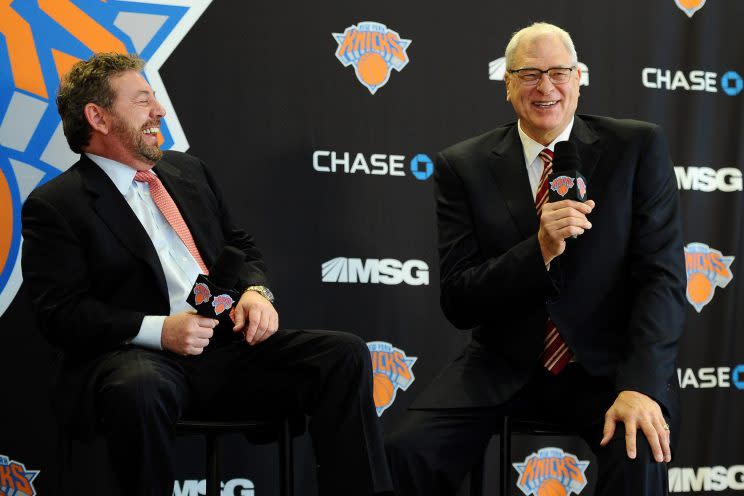Phil Jackson names his biggest mistake so far as Knicks president

Phil Jackson has been the center of much media discussion since he took over as president of the New York Knicks in 2014. Every decision he makes regarding the team’s personnel is analyzed endlessly both for its impact on the Knicks’ future and his outlook on the sport as a whole. As one of the NBA’s best-ever coaches and a regular commentator on the state of the sport, Jackson’s moves carry an extra level of intrigue that others do not.
However, all that analysis has largely overlooked what Jackson says has been his worst move during his 18 months with the Knicks. He revealed that regret during a discussion with his old friend Charley Rosen, now of Today’s Fastbreak:
“I don’t consider hiring [Derek Fisher] a mistake because he worked hard and got the guys to stay as positive as possible while the losses piled up. I think the biggest mistake I made was actually this…One of the first deals I engineered when I came back to New York was to trade Tyson Chandler and Raymond Felton to Dallas for Shane Larkin, Jose Calderon, Wayne Ellington, Samuel Dalembert, plus a second-round pick that the Mavs owed to the Celtics. In talking with Boston, I was given the option of taking that pick or else taking Jae Crowder. I liked Crowder but I thought he wouldn’t get much of a chance to play behind Carmelo, so I took the pick which turned out to be Cleanthony Early. While Cleanthony has missed lots of time in the past two seasons with us, he still has the potential to be a valuable player. Even so, I should have taken Crowder.
“Anyway, for all of us, making mistakes are part of the learning process.
James Herbert of CBSSports.com notes that Jackson has confused some details — the Celtics weren’t involved in the trade — but the mistake is understandable given that Crowder now plays for Boston and because the conversation with Rosen is fairly loose. The point is the same no matter the details. Jackson had the chance to take Crowder and decided to go for the second-round pick that became a player who has not contributed much.
Nevertheless, it was an understandable error for Jackson. The fact that the Mavericks were willing to part with Crowder in the deal speaks to his perceived value at the time. The 6-6 wing turned 24 in July 2014 and had played 78 games (with eight starts) for a Dallas team that won 49 games and finished eighth in the West. He performed well as a young role player, but not so fantastically that he registered as anything more than a spot-up shooter and effort-minded defensive type off the bench. Crowder’s development into one of the league’s premier “3-and-D” wings didn’t really occur until the Mavericks traded him to the Celtics in the deal that brought back Rajon Rondo in December 2014. Players thrive in certain environments, and there’s no guarantee that Crowder would have blossomed in the same way at Madison Square Garden.
If Knicks fans can quibble with Jackson’s choice of his biggest mistake, it’s perhaps only in the sense that he picked a relatively minor decision instead of the kind of big-picture thinking that often determines a franchise’s priorities and long-term success. The quality of any one front-office move often comes down to luck — which players got drafted when and where, a personal preference in free agency, a secondary trade inclusion like Crowder, etc. The best general managers set a course for a franchise and make good moves more often than not, and the worst do the opposite. To put it another way, former Minnesota Timberwolves GM David Kahn wasn’t bad at his job just because he picked two other point guards ahead of Stephen Curry. It was because that mistake was just one of several that indicated he was in over his head.
That explanation isn’t meant to slam Jackson, not least because he has to know a decision-maker is ultimately judged on his body of work. But it is a reminder that missing out on Jae Crowder will not mean much to his success with the Knicks. We care if he helps the Knicks transition into a brighter future built around a new core, not if he wins every single transaction.
– – – – – – –
Eric Freeman is a writer for Ball Don’t Lie on Yahoo Sports. Have a tip? Email him at efreeman_ysports@yahoo.com or follow him on Twitter!


